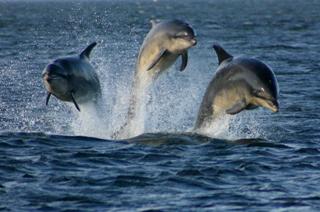Oct 17 2014
Offshore wind power is a valuable source of renewable energy that can help reduce carbon emissions. Technological advances are allowing higher capacity turbines to be installed in deeper water, but there is still much unknown about the effects on the environment.
 A critical element of wind energy planning is developing projects to avoid or minimize negative environmental impacts, particularly to protected marine species. Credit: University of Maryland Center for Environmental Science/Helen Bailey
A critical element of wind energy planning is developing projects to avoid or minimize negative environmental impacts, particularly to protected marine species. Credit: University of Maryland Center for Environmental Science/Helen Bailey
In a recent paper, University of Maryland Center for Environmental Science researcher Helen Bailey and colleagues review the potential impacts of offshore wind developments on marine species and make recommendations for future monitoring and assessment as interest in offshore wind energy grows around the world.
"As the number and size of offshore wind developments increases, there is a growing need to consider the consequences and cumulative impacts of these activities on marine species," said Helen Bailey, lead author and research assistant professor at the University of Maryland Center for Environmental Science's Chesapeake Biological Laboratory. "It is essential to identify where whales, dolphins and other species occur to help avoid adverse impacts and to continue to monitor their response to the construction and operation of wind turbines."
The loud sounds emitted during pile driving could potentially cause hearing damage, mask communication or disorient animals and fish as they move out of the area to avoid the noise. There is also a risk of marine animals being injured by ships or being disturbed by vessel movements associated with surveying and installation activities. On the other hand, wind turbines may act as artificial reefs and increase food sources. They could also potentially provide a de facto marine reserve thanks to restrictions on boating and fishing surrounding the wind turbines.
"A critical element of wind energy planning is developing projects in such a way that we avoid or minimize negative environmental impacts those installations may cause," said Tom Miller, director of the University of Maryland Center for Environmental Science's Chesapeake Biological Laboratory. "Making these decisions requires a year-round understanding of the species that frequent the area, particularly for protected species that are sensitive to sound, such as marine mammals."
Few studies have measured the response of marine species to offshore wind farm construction and operation, and none yet have assessed the longer terms impacts to the population of marine animals. The researchers recommend strategically targeted data collection and modeling to answer questions about impacts on marine species to help regulators make decisions, particularly in countries where the implementation of offshore wind energy is still in its early stages, such as the United States.
One such project begins this fall off the coast of Maryland where underwater microphones will be anchored to the ocean floor to continuously record sounds produced by large whales and other marine mammals. Led by Bailey, the study will collect two-years of baseline data that can be used to inform the design of wind farms, how to minimize the impact of construction noise and environmental impacts, and how to facilitate ocean planning in the area.
"It is becoming increasingly clear that the most significant impact of offshore wind farms on marine mammals is the avoidance of construction noise," said Bailey. "There needs to be a greater focus on assessing the longer-term impact of any behavioral responses."
Source: http://www.umces.edu/